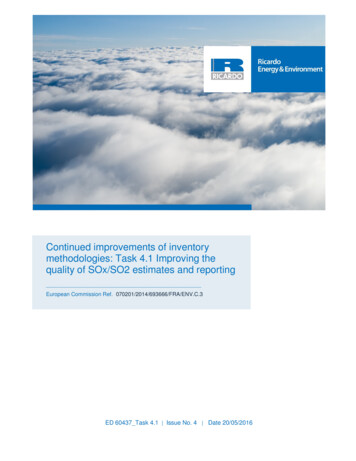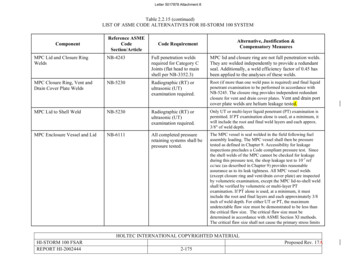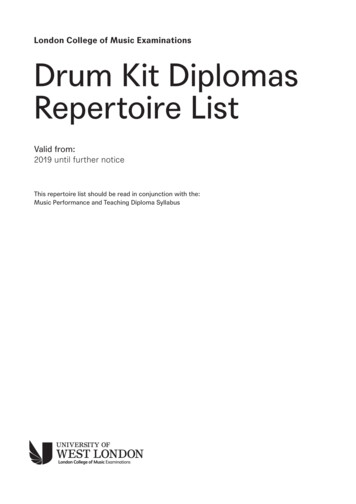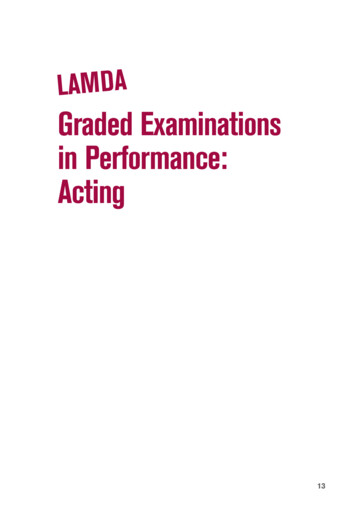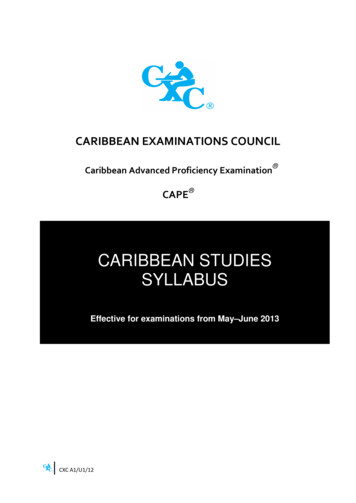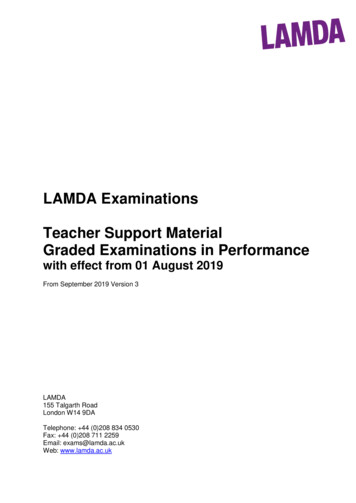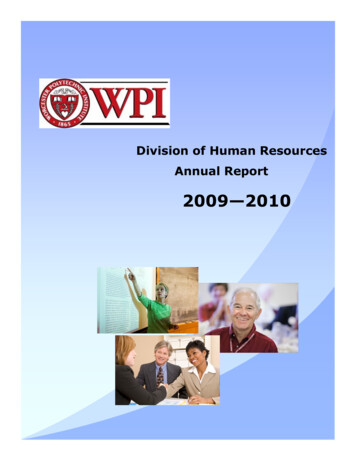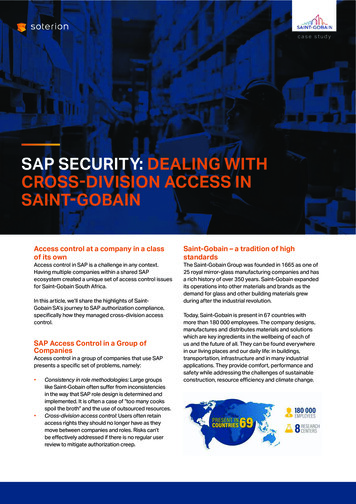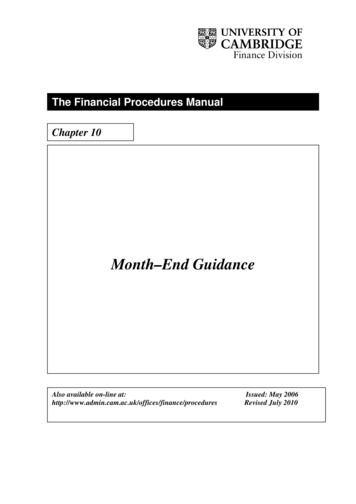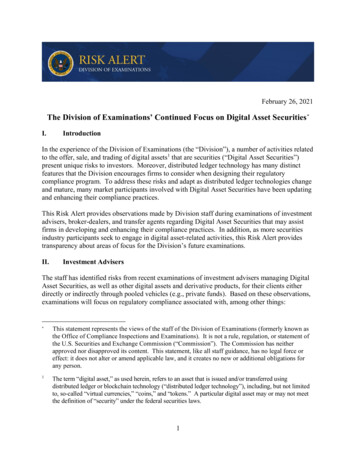
Transcription
February 26, 2021The Division of Examinations’ Continued Focus on Digital Asset Securities*I.IntroductionIn the experience of the Division of Examinations (the “Division”), a number of activities relatedto the offer, sale, and trading of digital assets1 that are securities (“Digital Asset Securities”)present unique risks to investors. Moreover, distributed ledger technology has many distinctfeatures that the Division encourages firms to consider when designing their regulatorycompliance program. To address these risks and adapt as distributed ledger technologies changeand mature, many market participants involved with Digital Asset Securities have been updatingand enhancing their compliance practices.This Risk Alert provides observations made by Division staff during examinations of investmentadvisers, broker-dealers, and transfer agents regarding Digital Asset Securities that may assistfirms in developing and enhancing their compliance practices. In addition, as more securitiesindustry participants seek to engage in digital asset-related activities, this Risk Alert providestransparency about areas of focus for the Division’s future examinations.II.Investment AdvisersThe staff has identified risks from recent examinations of investment advisers managing DigitalAsset Securities, as well as other digital assets and derivative products, for their clients eitherdirectly or indirectly through pooled vehicles (e.g., private funds). Based on these observations,examinations will focus on regulatory compliance associated with, among other things:*This statement represents the views of the staff of the Division of Examinations (formerly known asthe Office of Compliance Inspections and Examinations). It is not a rule, regulation, or statement ofthe U.S. Securities and Exchange Commission (“Commission”). The Commission has neitherapproved nor disapproved its content. This statement, like all staff guidance, has no legal force oreffect: it does not alter or amend applicable law, and it creates no new or additional obligations forany person.1The term “digital asset,” as used herein, refers to an asset that is issued and/or transferred usingdistributed ledger or blockchain technology (“distributed ledger technology”), including, but not limitedto, so-called “virtual currencies,” “coins,” and “tokens.” A particular digital asset may or may not meetthe definition of “security” under the federal securities laws.1
Portfolio management. A review of policies, procedures, and practices of investmentadvisers investing client assets in Digital Asset Securities and other digital assets willfocus in particular on the following areas:o Classification of digital assets managed on behalf of their clients, including whetherthey are classified as securities;2o Due diligence on digital assets (e.g., that the adviser understands the digital asset,wallets, or any other devices or software used to interact with the relevant digitalasset network or application, and the relevant liquidity and volatility of the digitalasset);o Evaluation and mitigation of risks related to trading venues and trade execution orsettlement facilities (e.g., with respect to security breaches, fraud, insolvency, marketmanipulation, the quality of market surveillance, KYC/AML procedures, andcompliance with applicable rules and regulations);o Management of risks and complexities associated with “forked” and “airdropped”digital assets (e.g., allocations thereof across client accounts, conflicts of interest, orother issues that may result from the fork or airdrop event);3 ando Fulfillment of their fiduciary duty with respect to investment advice – across all clienttypes.4 Books and records. Examinations will include a review of whether advisers are makingand keeping accurate books and records, including recording trading activity in2See Section 2(a)(1) of the Securities Act of 1933 (“Securities Act”) and Section 3(a)(10) of theSecurities Exchange Act of 1934 (“Exchange Act”), Section 2(a)(36) of the Investment Company Actof 1940 (“Investment Company Act”), and Section 202(a)(18) of the Investment Advisers Act of1940 (“Advisers Act”). See also Staff publication, Framework for “Investment Contract” Analysis ofDigital Assets (Apr. 3, 2019), available at ntract-analysis-digital-assets; Report of Investigation Pursuant to Section 21(a) of the SecuritiesExchange Act of 1934: The DAO (Exchange Act Rel. No. 81207) (July 25, 2017), available 1207.pdf.3Digital assets essentially operate on software running across networks of peers that create andmaintain shared ledger accounting for holdings of these assets. For purposes of this statement,“forked” refers to backward-incompatible protocol changes to a distributed ledger that createadditional versions of the distributed ledger, creating new digital assets. For the purpose of thisstatement, “airdropped” refers to the distribution of digital assets to numerous addresses, usually at nomonetary cost to the recipient or in exchange for certain promotional or other services.4Advisers Act Section 206. See also Commission Interpretation Regarding Standard of Conduct forInvestment Advisers, IA Rel. No. 5248 at 12 (June 5, 2019) 84 FR 33669 (July 12, 2019) at 33672(explaining that Section 206 imposes “a [fiduciary] duty to provide investment advice that is in thebest interest of the client, including a duty to provide advice that is suitable for the client”).2
accordance with the recordkeeping requirements, if applicable.5 Digital asset tradingplatforms vary in reliability and consistency with regard to order execution, settlementmethods, and post-trade recordation and notification, which an adviser should considerwhen designing its recordkeeping practices. Custody. Examinations will review the risks and practices related to the custody of digitalassets by investment advisers and examine for compliance with the custody rule (Rule206(4)-2 under the Adviser’s Act), where applicable.6 Regardless of how digital assets arestored, the staff will review:o Occurrences of unauthorized transactions, including theft of digital assets;o Controls around safekeeping of digital assets (e.g., employee access to private keysand trading platform accounts);o Business continuity plans where key personnel have exclusive access to privatekeys;o How the adviser evaluates harm due to the loss of private keys;o Reliability of software used to interact with relevant digital asset networks;o Storage of digital assets on trading platform accounts and with third partycustodians; ando Security procedures related to software and hardware wallets. Disclosures. Examinations will include a review of disclosures to investors in a varietyof media (e.g., solicitations, marketing materials, regulatory brochures and supplements,and fund documents) regarding the unique risks associated with digital assets, includingany risks that are heightened as a result of the digital nature of such assets.7 In particular,5See Advisers Act Rule 204-2 (“Books and Records Rule”), which requires advisers to make and keepcertain books and records relating to their investment advisory business, including typical accountingand other business records as required by the Commission.6Advisers Act Rule 206(4)-2 (the “Custody Rule”). See also Staff Letter: Engaging on Non-DVPCustodial Practices and Digital Assets (Mar.12, 2019), available custodial-practices-and-digital-assets; and StaffStatement on WY Division of Banking’s “NAL on Custody of Digital Assets and Qualified CustodianStatus” (Nov. 9, 2020), available at istered investment advisers are required to provide their advisory clients and prospective clientswith a written disclosure document (these requirements, and a few exceptions, are set forth in Rule204-3 under the Advisers Act).3
and among other things, the staff will assess disclosures regarding specific risks,including the complexities of the products and technology underlying such assets,technical, legal, market, and operational risks (including custody and cybersecurity),price volatility, illiquidity, valuation methodology, related-party transactions, andconflicts of interest.III. Pricing client portfolios. Investment advisers apply a variety of valuation methods todetermine the value of digital assets managed on behalf of clients. Investment advisersmay face valuation challenges for digital assets due to market fragmentation, illiquidity,volatility, and the potential for manipulation. Examinations will include a review of,among other things, the valuation methodologies utilized, including those used todetermine principal markets, fair value, valuation after significant events, and recognitionof forked and airdropped digital assets.8 The staff will also review disclosures related tovaluation methodologies, and advisory fee calculations and the impact valuation practiceshave on these fees. Registration issues. For investment advisers, examinations will include a review ofcompliance matters related to appropriate registration. This includes, among other things,understanding how the investment adviser calculates its regulatory assets undermanagement,9 and characterizes the digital assets in the pooled vehicles it manages10 andthe status of clients.11 For private funds managed by investment advisers, this alsoincludes understanding how the funds determine applicable exemptions from registrationas investment companies.12Broker-DealersThe staff has identified risks through regulatory coordination and through observations fromrecent examinations of broker-dealers. Due to the risks the staff has observed, futureexaminations of broker-dealers will focus on regulatory compliance associated with, among8See, e.g., Staff Letter: Engaging on Fund Innovation and Cryptocurrency-related Holdings (Jan. 18,2018), available at 2018/cryptocurrency011818.htm.9Advisers Act Section 203A sets forth the requirements for investment adviser registration, including assetsunder management thresholds.10See The definition of “investment company,” contained in Section 3(a) of the Investment Company Act.11See General Instructions to Form ADV, available at s.pdf and definition of “client” in Item 7 of the Glossary of Terms.12A private fund or other pooled investment vehicle that meets the definition of an “investmentcompany” in Section 3(a) of the Investment Company Act must register with the SEC as aninvestment company, unless it satisfies an exclusion or exemption from that definition. See, e.g.,Crypto Asset Management, LP and Timothy Enneking, Securities Act Rel. No. 10544 (Sept. 11,2018) (settled order), available at .pdf.4
other things: Safekeeping of funds and operations. The staff will examine broker-dealers tounderstand operational activities, including operations that are unique to the safety andcustody of Digital Asset Securities.13 Registration requirements. Examinations will include broker-dealers’ and any affiliatedentities’ compliance with registration requirements. For example, if an affiliate of aregistered broker-dealer engages in the business of effecting transactions in Digital AssetSecurities for the accounts of others, that affiliate may be required to register as a brokerdealer.14 Anti-Money Laundering (AML). Certain pseudonymous aspects of distributed ledgertechnology present unique challenges to the robust implementation of an AML program.The staff has observed broker-dealer AML programs that have not consistently addressedor implemented routine searches or, to the extent they implemented routine searches,have not updated those searches to check against the Specially Designated Nationals listmaintained by the Office of Foreign Assets Control (“OFAC”) at the U.S. Department ofthe Treasury. The staff also has observed inadequate AML procedures, controls, anddocumentation regarding Digital Asset Securities. The staff will continue to examinebroker-dealer compliance with AML obligations (e.g., filing suspicious activity reportsand performing customer due diligence).1513See Exchange Act Rules 15c3-1, 15c3-3, 17a-3, and 17a-4. See also Commission Statement andRequest for Comment, Custody of Digital Asset Securities by Special Purpose Broker-Dealers, datedDecember 23, 2020, available at https://www.sec.gov/rules/policy/2020/34-90788.pdf (setting forthtime-limited circumstances for broker-dealer custody of digital asset securities and requestingcomment); Letter to Ms. Kris Dailey, Financial Industry Regulatory Authority (FINRA), ATS Role inthe Settlement of Digital Asset Security Trades, dated September 25, 2020, available set-security-trades-09252020.pdf (setting forth the Commission’s Division of Trading and Marketsstaff position describing circumstances under which staff will not recommend enforcement actionagainst a broker-dealer operating an ATS that trades digital asset securities using a specified 3-stepprocess); Joint Staff Statement on Broker-Dealer Custody of Digital Asset Securities, dated July 8,2019, available at ecurities (statement of the Commission’s Division of Trading and Markets andFINRA Office of General Counsel concerning application of federal securities laws and FINRA rulesto the potential intermediation of digital asset securities and transactions).14Securities exchanges and broker-dealers are required to be registered under the Exchange Act Sections 6and 15(a), respectively. See generally the Division of Trading and Markets Investor Publication: Guideto Broker-Dealer Registration (April 2008), available at ns/divisionsmarketregbdguidehtm.html#II.15See, e.g., Bank Secrecy Act implementing rules at 31 CFR 1023.320 (suspicious activity rule), 31CFR 1023.210 (AML program rule including customer due diligence requirement), and 31 CFR1010.320 (beneficial ownership rule). See also FINRA 3310 (AML compliance program rule forFINRA member firms); SEC’s AML Source Tool for Broker-Dealers, available at5
Offerings. Broker-dealers may be involved in underwriting and private placementactivity with respect to Digital Asset Securities, which can raise unique disclosure anddue diligence obligations.16 Examinations will include a review of the due diligenceperformed by broker-dealers, and the disclosures made by broker-dealers to customersrelated to the offering of Digital Asset Securities.17 Disclosure of conflicts of interest. As the staff has observed, broker-dealers may operatein multiple capacities, including as trading platforms or proprietary traders of DigitalAsset Securities on their own and other platforms.18 Examinations will include a reviewof the existence and disclosures of conflicts of interest and the compliance policies andprocedures to address them. Outside Business Activities. The staff has observed instances of registeredrepresentatives of broker-dealers offering services related to digital assets apart from theiremployer. FINRA-member broker-dealers must evaluate the activities of their registeredpersons to determine whether such activity constitutes outside business activities or anoutside securities activity and therefore should be subjected to the approval, supervision,and recordation of the broker-dealer.19 The staff will continue to review FINRA-memberbroker-dealer compliance processes in connection with the evaluation, approval, andmonitoring of outside business amlsourcetool.htm. In addition, for FINRA member firms,the staff will assess firms’ compliance with FINRA Rule 2090 (“Know Your Customer” rule).16Securities Act Section 17(a), Exchange Act Section 10(b), and FINRA Regulatory Notice 10-22Regulation D Offerings – Obligation of Broker-Dealers to Conduct Reasonable DiligenceInvestigations in Regulation D Offerings.17To the extent a broker-dealer engages in trading on behalf of clients or in their own accounts, the staffwill examine for compliance with relevant rules.18See also Exchange Act Section 15(c) and FINRA Rules 2010 and 2020.19FINRA Rule 3270. See also FINRA Rule 3280.6
IV.National Securities Exchanges Exchange Registration. Advances in distributed ledger technology have introducedinnovative methods for facilitating electronic trading in Digital Asset Securities. Aplatform that operates as an “exchange” as defined under Section 3(a)(1) of the ExchangeAct and Rule 3b-16(a) thereunder must register as a national securities exchange oroperate pursuant to an exemption.20 The staff will examine platforms that facilitatetrading in Digital Asset Securities and review whether they meet the definition of anexchange. Compliance with Regulation ATS. One exemption from national securities exchangeregistration that is available to an entity that meets the definition of an exchange is theexemption for alternative trading systems (“ATSs”).21 Examinations will include areview of whether an ATS that trades Digital Asset Securities is operating in compliancewith Regulation ATS, including, among other things, whether the ATS has accuratelyand timely disclosed information on Form ATS and Form ATS-R, and has adequatesafeguards and procedures to protect confidential subscriber trading information.V.Transfer Agents Compliance with Transfer Agent Rules. Distributed ledger technology is increasinglybeing used by issuers of securities to perform, directly or indirectly, various shareholderadministrative functions, including recordation of ownership.22 The Commission has20Exchange Act Rule 3b-16 provides a functional test to assess whether an entity meets the definition ofan exchange under Section 3(a)(1) of the Exchange Act. Exchange Act Rule 3b-16(a) provides thatan entity shall be considered to constitute, maintain, or provide “a market place or facilities forbringing together purchasers and sellers of securities or for otherwise performing with respect tosecurities the functions commonly performed by an exchange” if such organization, association, orgroup of persons: (1) brings together the orders for securities of multiple buyers and sellers; and (2)uses established, non-discretionary methods (whether by providing a trading facility or by settingrules) under which such orders interact with each other, and the buyers and sellers entering suchorders agree to the terms of the trade. See, e.g., Zachary Coburn, Exchange Act Rel. No. 84553 (Nov.8, 2018) (settled order), available at .pdf.21Exchange Act Rule 3a1-1(a)(2) exempts from the Exchange Act Section 3(a)(1) definition of“exchange” an organization, association, or group of persons that complies with Regulation ATS. Aperson or entity that meets the definition of an exchange and complies with Regulation ATS is notrequired to register as a national securities exchange. An entity that meets the exchange definitionthat fails to comply with the requirements of Regulation ATS would no longer qualify for theexemption provided under Rule 3a1-1(a)(2), and thus, could be deemed to be operating as anunregistered exchange in violation of Section 5 of the Exchange Act. See Exchange Act Release No.83663 (July 18, 2018) 83 FR 38768 (August 7, 2018) at 38772.22Section 3(a)(25) of the Exchange Act defines “transfer agent.”7
promulgated rules for registered transfer agents23 that are intended to facilitate promptand accurate clearance and settlement of securities transactions. Examinations willinclude a review of whether registered transfer agents servicing Digital Asset Securitiesare operating in compliance with such rules.VI.ConclusionIn sharing the focus areas for the digital asset initiatives, the Division encourages marketparticipants to reflect upon their own practices, policies and procedures, as applicable, and topromote improvements in their supervisory, oversight, and compliance programs. The Divisionunderstands that, as financial innovation continues, market participants may have questions as totheir regulatory obligations. Should such questions arise regarding Digital Asset Securities,market participants are encouraged to engage with the Commission’s staff through the agency’sStrategic Hub for Innovation Technology (“FinHub”). To contact Commission staff forassistance, please visit the Commission’s FinHub webpage.24This Risk Alert is intended to highlight for firms risks and issues that Division staff hasidentified. In addition, this Risk Alert describes factors that firms may consider to (i)assess their supervisory, compliance, and/or other risk management systems related tothese risks, and (ii) make any changes, as may be appropriate, to address or strengthensuch systems. These factors are not exhaustive, nor will they constitute a safe harbor.Other factors besides those described in this Risk Alert may be appropriate to consider,and some of the factors may not be applicable to a particular firm’s business. Whilesome of the factors discussed in this Risk Alert reflect existing regulatory requirements,they are not intended to alter such requirements. Moreover, future changes in laws orregulations may supersede some of the factors or issues raised here. The adequacy ofsupervisory, compliance, and other risk management systems can be determined onlywith reference to the profile of each specific firm and other facts and circumstances.2324Section 17A(c) of the Exchange Act requires transfer agents to register with the Commission. SeeExchange Act Rules 17Ad-1 to 17Ad-7.https://www.sec.gov/finhub.8
Feb 26, 2021 · 5 See Advisers Act Rule 204-2 (“Books and Records Rule”), which requires advisers to make and keep certain books and records relating to their investment advisory business, including typical accounting and other business records as required by the Commis
